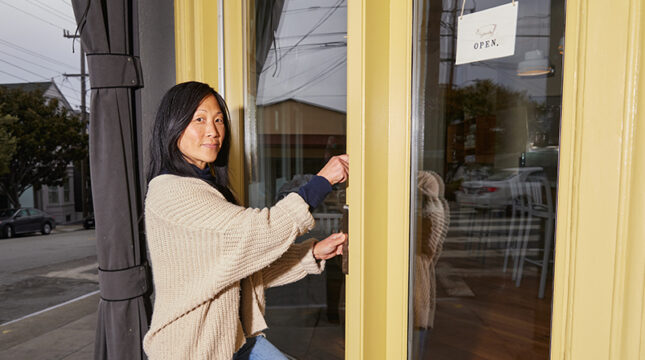Do you need an Ohio liquor license to sell alcohol?
Food service business owners looking to include alcohol on their menu in Ohio must have a license issued by the Ohio Department of Commerce’s Division of Liquor Control (DOLC).
According to Ohio laws, businesses may serve alcohol from 5:30 a.m. until 1:00 a.m. Monday through Saturday. Companies may apply for a permit to extend sales hours until 2:30 a.m. on those days. The hours for alcohol sales on Sunday, if allowed, are determined by the local area.
Additionally, Ohio allows for Local Option Elections, which allows cities and communities to limit the types of alcohol and selling hours in that area, up to and including an outright ban on all alcohol.
Finally, the DOLC issues service industry licenses on a quota system, which means they only issue a certain number of licenses based on local population size. You may not be able to get a new license from the state but will have to purchase someone’s licensed business to get your own.
How much is a liquor license in Ohio?
Applying for a new liquor license in Ohio comes with a non-refundable $100 fee. Once approved, the cost of the license varies depending on the type of license you are issued:
- D-1: Beer only, $376
- D-2: Wine and mixed beverages, $564
- D-3: Spirituous liquor, $750
- D-3A: Extended sales hours, $938
- D-5: Spirituous liquor, beer, wine and mixed beverages, $2,344
How to get a liquor license in Ohio
The three main requirements to obtain a liquor license in Ohio are:
- You must be a United States citizen.
- You must be 21 or older.
- You must not have been convicted of a felony that “is reasonably related to the person’s fitness to operate a liquor permit business.”
Local requirements, including zoning, health inspection, food service certificate, and/or insurance, will vary depending on local rules and regulations. Contact your local authorities to understand the requirements in your area.
The Ohio Department of Liquor Control (DOLC) controls all alcohol sales within Ohio, from manufacturing to distribution to sales, and offers different licenses and permits depending on the type of business and the kinds of alcohol being made, delivered, and sold.
For those in the food service industry, the licenses you’ll want to look into are:
- D-1: Beer for on-premises consumption or in original sealed containers for carryout until 1 A.M.
- D-2: Wine and mixed beverages for on-premises consumption or in original sealed containers for carryout until 1 A.M.
- D-3: Spirituous liquor for on-premises consumption until 1 A.M.
- D-3A: Extends sales hours from 1 A.M. to 2:30 A.M. (Must at least have D-3 to get the 3A.)
- D-5: Spirituous liquor for on-premises consumption only, and beer, wine, and mixed beverages in original sealed containers for on- or off-premises until 2:30 A.M.
While beer and wine are pretty straightforward, under Ohio law, “mixed beverages” are defined as bottled or prepared cordials, cocktails and pre-packaged drinks containing less than 21% alcohol by volume. “Spirituous liquor” is any intoxicating liquor that contains more than 21% alcohol by volume.
All of the above licenses (except D-3A) have a quota of one license for every 2,000 people per municipal area or township.
The DOLC website lays out the process of getting a license. Here’s what happens:
Application review
When you submit your liquor license application, the first step is a thorough review by the DOLC. They check every detail to ensure your application is complete. This is crucial, as missing information could delay the process.
Database entry
Once your application passes the review, it’s entered into the DOLC’s database. This step is key for tracking and processing your application efficiently. It’s the bridge between submitting your application and the actual assessment process.
Three-week actions
In the following three weeks, DOLC gets the ball rolling. They’ll begin to:
- Send local legislative notices to your township trustees, county commissioners, or city council, as applicable, to determine whether they object to your pending new or transfer application and want a hearing.
- Notify any institutions, like schools, churches, or public playgrounds, within 500 feet of your proposed permit location to determine whether they object to your application and want a hearing.
- Inspect your proposed permit location to determine whether it meets Ohio’s rules and regulations for the type of permit requested.
- Provide your local law enforcement agency, city, or county a copy of your personal history background form so they can conduct a local police check of your criminal background.
- Contact your county board of elections to determine your location’s ward and precinct history so that your wet/dry status can be determined.
- Request additional documents if the documents submitted at the time of your application require additional information.
If you have any questions about the process, contact the Department of Commerce for help at fileinquiry@com.ohio.gov.
How long does it take to get a liquor license in Ohio?
If everything goes perfectly — no protest hearing is requested, and no adverse information is discovered during your background check — you could have your liquor license within 10 to 12 weeks of submitting your completed application.
Of course, this assumes the license quota isn’t full in your area. If it is, you have two choices: Keep your application with the DOLC or find someone willing to sell their license (and business).
When you keep your application with the DOLC, they put it at the back of the line for those wanting that license type. As businesses either choose not to renew or lose their license for any other reason, the DOLC takes the oldest application for that type of license and begins its approval process.
The DOLC provides a liquor permit waitlist for every county, updated regularly so potential applicants can see how many applicants (if any) are ahead of them.
Insurance for an Ohio liquor license
The state of Ohio does require certain business insurance for all businesses, but your local authorities may require additional coverage as well. Be sure to check your local laws when it comes to insurance liability.
Here are some standard food service insurance options that Ohio business owners should consider:
Liquor liability insurance
Think of this as your safety net due to Ohio’s dram shop laws. While it’s not mandatory, liquor liability insurance is a smart choice. If a guest causes trouble after drinking at your place, this insurance can help with medical bills, property damage, and legal costs.
General liability insurance
Accidents happen when you work with the public. General liability insurance helps cover the most common incidents, including slip and fall and accidental property damage.
Workers’ compensation insurance
Ohio is one of four monopolistic states regarding workers’ compensation insurance. This means every business must purchase workers comp insurance from the state. It’s there to support you if an employee gets hurt or sick because of their work. From medical expenses to lost wages, it helps you take care of your team when they need it most.
Commercial property insurance
Commercial property insurance helps protect the building you run your business out of and covers your equipment, business goods, gear and even inventory.
Can an Ohio liquor license be transferred?
If the license quota you want is already full and you don’t feel like waiting for one to become available through the DOLC, you can purchase one.
However, business owners cannot purchase liquor licenses on their own. If you wish to purchase a license from someone else, you will have to purchase their entire business, as well.
There are three types of liquor license transfers in Ohio:
- Person-to-person transfer: The business continues to operate at the original location under new ownership.
- Location-to-location: The address of the business moves, but the ownership remains the same.
- Person and location: There is new ownership and the business location changes.
If you’re doing a person-to-person transfer, you can continue selling alcohol while the DOLC is approving the transfer. However, if you transfer the location of the license, whether in moving your business or moving a business you’ve recently purchased, you cannot sell alcohol at the new location until the DOLC has approved the transfer.
Ohio liquor license renewal
In Ohio, liquor licenses renew on either February 1st, June 1st or October 1st, depending on where your business is located.
You’ll get a letter 60 days before your license expires inviting you to renew. Anyone wanting to object to your license renewal must do so at least 30 days before your license’s expiration date.
The cost to renew is the same as what you paid initially. The fee varies depending on your license type.
You may renew for the standard fee until 15 days before your license expires. If you miss that, the DOLC will add a 10% late fee. You may renew your license with the additional late fee until 30 days after your expiration date.
After 30 days, you will lose your license, and the DOLC will begin the approval process for the next business on the waiting list for your license type.
Ohio liquor license liability and dram shop laws
Ohio follows dram shop liability laws, which is important for any restaurant serving alcohol. This means that if your business serves alcohol to a minor or someone who’s already intoxicated, and they go on to cause harm, injury, or even death because of their drunkenness, your restaurant could be held accountable.
For example, imagine a group visits your restaurant to celebrate a friend’s wedding. They’re in high spirits, enjoying several rounds of drinks. However, things take a turn for the worse when they’re involved in a car accident on their way home, injuring another driver. If the driver was found to be over the legal alcohol limit, your restaurant could face legal action. In these cases, your business might be responsible both legally and financially for the incident.
In Ohio, anyone serving alcoholic drinks in a restaurant must be at least 19 years old. However, to make drinks and sell them — to be a bartender at a restaurant — the employee must be at least 21 years of age.
How NEXT helps support Ohio bars, restaurants and food and beverage businesses
NEXT gives small business owners customized insurance on tap. We can help protect you and your business with liquor liability insurance, general liability coverage and more.
The best part? It’s all online and super fast. In about 10 minutes, you can get a quote, review coverage options, buy your insurance and get a certificate of insurance. NEXT is insurance at the speed of business.
Start a free quote with NEXT.






